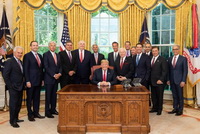The vital contributions to the U.S. economy and job creation by the travel and tourism industry were the focus of a meeting Tuesday between President Trump and CEOs of 13 hospitality companies, including four members of The Real Estate Roundtable.
 |
Among the hotel CEOs participating in the White House meeting on travel and tourism this week were former Real Estate Roundtable Chairman Chris Nassetta of Hilton, along with Roundtable members Elie Maalouf of InterContinental Hotels Group; Patrick Pacious of Choice Hotels International; and James Risoleo of Host Hotels & Resorts, Inc. - enlarge photo - |
A panel discussion at The Roundtable's June 14 Annual Meeting focused on the travel and tourism issue. Participants included Senator Amy Klobuchar (D-MN); Roundtable Board Member Anthony E. Malkin, Chairman and CEO, Empire State Realty Trust; USTA's Roger Dow; and American Hotel & Lodging Association's President and CEO Katherine Lugar. (Roundtable Weekly, June 15, 2018.)
House Financial Services Committee Chairman Jeb Hensarling (R-TX) on Sept. 6 unveiled a sweeping proposal to overhaul the housing finance system in the United States during a hearing entitled, "A Failure to Act: How a Decade without GSE Reform Has Once Again Put Taxpayers at Risk."
 |
House Financial Services Committee Chairman Jeb Hensarling (R-TX) on Sept. 6 unveiled a sweeping proposal to overhaul the housing finance system in the United States during a hearing entitled, "A Failure to Act: How a Decade without GSE Reform Has Once Again Put Taxpayers at Risk." |
Hensarling concluded his committee statement, "If the political will to enact such reform stalls in this Congress or the next, the Administration can and should effectuate change. The President will appoint a new Federal Housing Finance Agency Director in January. With apologies to The Rolling Stones, 'you can't always get what you want, but if you try some time, you just might find, you get what you need' to avert the next housing crisis." (Hensarling statement on YouTube)
As House Republican leaders this week promoted a second round of tax cuts before the mid-term elections, Reps. Kenny Marchant (R-TX) and Joe Crowley (D-NY) introduced legislation yesterday to repeal the Foreign Investment in Real Property Tax Act of 1980 (FIRPTA).
 |
A recent report by the Rosen Consulting Group (RCG) estimated that FIRPTA repeal would generate an initial increase of between $65 billion and $125 billion in international investment in U.S. commercial real estate. |
"In 2015, Congress passed the most significant reforms of FIRPTA since its passage in 1980. Congress should build on the recent success by repealing FIRPTA outright as part of tax reform. Unleashed by FIRPTA's repeal, capital from abroad would create jobs by financing new real estate developments, as well as the upgrading and rehabilitation of existing buildings. Architects, engineers, construction firms, subcontractors, and others would be put to work building and improving commercial buildings and infrastructure," DeBoer testified. (Roundtable Statement for the Record, Senate Finance Committee Sept 2017)
Tax Reform 2.0
GOP leaders aiming to pass another round of tax reforms through the House before the November mid-term elections are planning next week to introduce "Tax Reform 2.0" legislation. The bill would make the individual tax cuts contained in President Donald Trump's December tax overhaul permanent, while expanding taxpayer savings opportunities.
 |
House Ways and Means Committee Chairman Kevin Brady (R-TX) commented, "... next week we will introduce legislation to make permanent the small business and individual tax cuts that are driving these positive economic numbers. This investment into our workers will produce over a million and a half new jobs, continue to boost wages, and increase America's competitiveness for years to come." (Accounting Today, Sept. 7). |
The central feature of the reform proposal — a permanent extension of tax cuts for individuals — is unlikely to pass the Senate, where it would need Democratic support (The Hill, July 24). Additionally, the introduction of a Tax Reform 2.0 bill may delay legislation addressing tax technical corrections until after the November elections. (Roundtable Weekly, July 20)